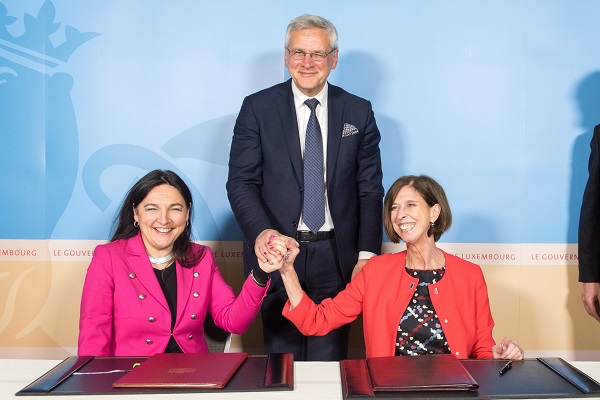
On Monday 4 July 2016, the governments of Luxembourg and Belgium (Gäichel IX) held a joint meeting at the Domaine de la Gäichel under the chairmanship of respective Prime Ministers Xavier Bettel and Charles Michel.
This "Gäichel" meeting, named after the Luxembourg village where the first summit meeting was held between the two governments in 2004, was focused on European and international issues, including bilateral relations and strengthening cooperation between the two neighbouring countries. Following the meeting, a joint declaration was released.
The declaration stated that the meeting was being "held at a crucial moment for the future of Europe", at a time when the values and progress of the EU project are being questioned.
Faced with "the instability on Europe's borders confronting us with crises sending many refugees onto the path of exile", the two countries stated that Member States needed to band together to defend and develop the values upon which the EU was built, highlighting the "particularly deep and ancient relations betwwen Belgium and Luxembourg" as a "key factor in this commitment to a strong Europe to benefit our citizens". The two governments agreed to further cooperation in the future.
Both powers expressed regret at the decision by 52% of the British population to leave the European Union, stating that "this decision affects the European Union and in a special way it also affects Luxembourg and Belgium as partners of the UK". They expressed their belief that the European Council agreement of February 2016 has now lapsed and stated it is important that the UK inform the Council of its intentions as soon as possible.
In spite of the UK's decision, the two governments, as founding countries of the EU, claimed they remain convinced that the Union "provides a unique and indispensable framework for promoting the values of respect for human dignity, freedom, democracy, equality, the rule of law and respect for human rights". They called for the EU to invest "against external and internal threats, to establish a stable and supportive framework to manage migration and refugee flows".
In the context of the latter aspect, they found that the EU-Turkey declaration has begun to bear fruit, despite international humanitarian organisation Médecins sans Frontières (MSF) deciding to reject European funding in the wake of the agreement to condemn the fact that thousands had been left stranded.
The two countries also addressed the subject of nuclear energy, despite holding diverging opinions on the necessity of its use. Both governments agreed to cooperate more closely in terms of transparency and information, announcing that "cross inspections in nuclear facilities and in the medical sector will be extended", as will exchanging information on nuclear power plant reactor vessels, the Radon problem and contingency planning.
As part of the continuation of existing agreements between the Belgium and Luxembourg, the two countries signed a bilateral agreement which will see Luxembourg's radioactive waste, primarily from discontinued consumer products, managed and disposed of in Belgium. The agreement is a first in Europe and marks the commitment of both governments to properly treat this waste in the interest of its citizens. The agreement also highlighted the importance of research and development to this end.
The two sides have pledged to each ratify the agreement before the end of the year.
Photo by SIP/Charles Caratini (L-R): Marie-Christine Marghem, Minister of Energy, Environment and Sustainable Development; Kris Peeters, Deputy Prime Minister and Minister of Employment, Economy and Consumer Affairs, for Foreign Trade; Lydia Mutsch, Minister of Health, Minister for Equal Opportunities








